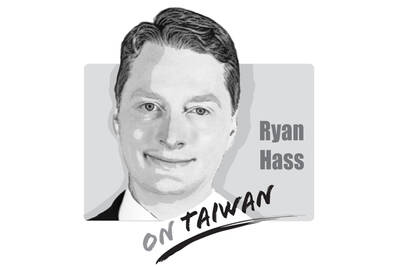Former president Lee Teng-hui’s (李登輝) recent visit to Japan has sparked a chorus of criticism from President Ma Ying-jeou’s (馬英九) administration, Chinese Nationalist Party (KMT) leaders and the Chinese government, following remarks Lee made on Thursday in the Diet, including the statement: “All Taiwan’s troubles over the past half-century stem from China.”
When Lee was president, his attempts to explain Taiwan-China relations culminated in the “special state-to-state relationship” he referred to in a 1999 interview with German broadcaster Deutsche Welle.
Sixteen years later, Lee’s vision has become reality as majority public opinion continues to move away from support for unification and identification with China. A survey conducted last month by the National Chengchi University’s Election Study Center found a record-low 3.3 percent of respondents regard themselves as Chinese, while 9.1 percent support “unification” — also a record low. When the institution first conducted the survey in 1992, 25.5 percent of respondents saw themselves as “Chinese,” while 20 percent favored unification over independence or maintenance of the “status quo.”
Since Ma came to office in 2008, his administration’s sinicization policy appears to have had little impact on majority public opinion, but it has effectively driven the nation into obscurity in terms of its international recognition.
Veteran diplomat Mainland Affairs Council Minister Andrew Hsia (夏立言) summed up the the damage to Taiwan’s international status done by Ma’s rhetoric when he described the remarks of an ambassador from one of the nation’s diplomatic allies.
“I discovered today that you are not an independent country,” the ambassador said when he learned of Ma’s policy of “no independence” — one of his “three noes” pledges, along with “no unification” and “no use of force,” aimed at maintaining the “status quo” in cross-strait relations.
The example shows that although China has never given up its claim of sovereignty, Taiwan must bear some responsibility for being recognized as a sort of Chinese creature, rather than a sovereign state.
Two days after Lee’s speech, Hsia delivered a speech in Greece, in which he said the relationship between Taiwan and China was one “between two regions of one country, with the country being the Republic of China” — rhetoric repeatedly espoused by the Ma administration over the past eight years.
In an attempt to placate China, in 2009 Taiwan did not ask its diplomatic allies to submit a proposal for the nation to be represented at the annual UN General Assembly — which it had done every year since 1993.
In addition, Ma’s administration caved in and Taiwan began to participate in the WHA as an observer under the name “Chinese Taipei” in 2009, an arrangement subject to annual renewal with China’s consent.
Ma also accepted Beijing’s terms for Taiwan’s one-off attendance at the International Civil Aviation Organization Assembly in 2013 as a “guest” of the UN body’s council president.
How can the stereotype of the international community regarding the sovereignty of Taiwan be challenged if the nation’s government echoes Beijing’s position?
Under Chinese President Xi Jinping (習近平), Beijing has shifted its strategy of attempting to annex Taiwan via verbal propaganda to more overt activities.
However, despite the wishes of the public, Taiwan has yet to come up with a viable counter-strategy that would reinforce its status as a separate nation and still remains mired in political infighting.

There has been much catastrophizing in Taiwan recently about America becoming more unreliable as a bulwark against Chinese pressure. Some of this has been sparked by debates in Washington about whether the United States should defend Taiwan in event of conflict. There also were understandable anxieties about whether President Trump would sacrifice Taiwan’s interests for a trade deal when he sat down with President Xi (習近平) in late October. On top of that, Taiwan’s opposition political leaders have sought to score political points by attacking the Lai (賴清德) administration for mishandling relations with the United States. Part of this budding anxiety
The diplomatic dispute between China and Japan over Japanese Prime Minister Sanae Takaichi’s comments in the Japanese Diet continues to escalate. In a letter to UN Secretary-General Antonio Guterres, China’s UN Ambassador Fu Cong (傅聰) wrote that, “if Japan dares to attempt an armed intervention in the cross-Strait situation, it would be an act of aggression.” There was no indication that Fu was aware of the irony implicit in the complaint. Until this point, Beijing had limited its remonstrations to diplomatic summonses and weaponization of economic levers, such as banning Japanese seafood imports, discouraging Chinese from traveling to Japan or issuing
On Nov. 8, newly elected Chinese Nationalist Party (KMT) Chairwoman Cheng Li-wun (鄭麗文) and Vice Chairman Chi Lin-len (季麟連) attended a memorial for White Terror era victims, during which convicted Chinese Communist Party (CCP) spies such as Wu Shi (吳石) were also honored. Cheng’s participation in the ceremony, which she said was part of her efforts to promote cross-strait reconciliation, has trapped herself and her party into the KMT’s dark past, and risks putting the party back on its old disastrous road. Wu, a lieutenant general who was the Ministry of National Defense’s deputy chief of the general staff, was recruited
The Food and Drug Administration (FDA) on Nov. 5 recalled more than 150,000 eggs found to contain three times the legal limit of the pesticide metabolite fipronil-sulfone. Nearly half of the 1,169 affected egg cartons, which had been distributed across 10 districts, had already been sold. Using the new traceability system, officials quickly urged the public to avoid consuming eggs with the traceability code “I47045,” while the remainder were successfully recalled. Changhua County’s Wenya Farm — the source of the tainted eggs — was fined NT$120,000, and the Ministry of Agriculture instructed the county’s Animal Disease Control Center to require that